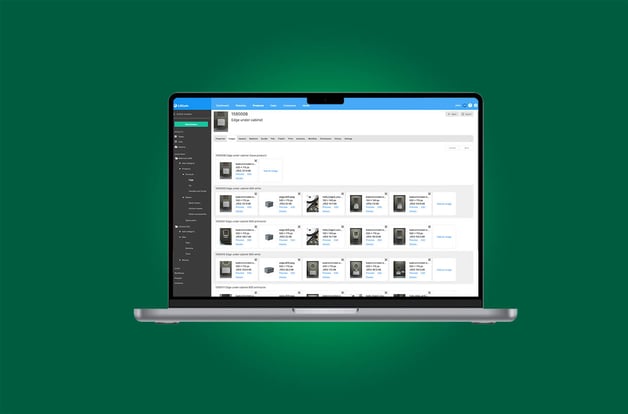In today’s digital landscape, the demands for structure, accessibility, and quality of product information are higher than ever. For B2B companies, this is especially challenging — large product catalogs, multiple sales channels, and complex relationships between products require smarter solutions. That’s why many are asking the question: Why do B2B companies need a PIM? In this post, we break down the answer.
What Is a PIM System and How Does It Work?
PIM stands for Product Information Management, and it’s a system designed to collect, structure, and distribute product data in a consistent way. For B2B companies, it provides a central hub where information such as product names, descriptions, specifications, images, documents, and pricing is managed — instead of being scattered across Excel files, business systems, and websites.
By using a PIM, you gain full control of your product information and can easily export it to e-commerce platforms, catalogs, internal systems, or resellers. Want to learn more about what a PIM system is? Check out our blog post here.
Why B2B Companies Need a PIM to Manage Complex Product Data
B2B companies often manage thousands of products with detailed information and multiple variants. A PIM makes it possible to manage:
- Product variants (e.g., different sizes, colors, materials)
- Technical specifications and certifications
- Multilingual product information
- Relationships between products, accessories, and spare parts
Without a PIM, product data is at risk of becoming inconsistent, incorrect, or inaccessible — which can quickly lead to lost business and inefficient internal processes.
How a PIM Improves the Customer Experience in B2B Sales
B2B customers expect clear and accurate information to make informed decisions. A PIM enables you to:
- Publish up-to-date and accurate information across all channels
- Launch new products and assortments quickly
- Customize product data for different markets or segments
- Make it easier for resellers and partners to find the right information
This creates a professional experience and increases both conversion rates and customer satisfaction.

Streamline Internal Processes with a PIM for B2B
A PIM not only enhances external communication — it also streamlines internal workflows. Marketing teams, product managers, IT, and sales departments all gain a shared tool to:
- Reduce duplication of work and manual errors
- Quickly find and update product information
- Automate publishing to various platforms
- Coordinate product launches and campaigns more easily
The result is better collaboration and more time for value-creating activities.
Why Isn’t My ERP Enough?
Many B2B companies ask: “We already have an ERP — why do we need a PIM too?” It’s a valid question. ERP systems (Enterprise Resource Planning) are typically the hub for business-critical data like inventory levels, pricing, and order processing. But when it comes to detailed, market-ready product information, an ERP falls short.
An ERP system isn’t built to handle:
- Multiple images, documents, and technical specs per product
- Translations and localized information for different markets
- Rich product descriptions and relational data
- Publishing data to various external channels (e.g., e-commerce, catalogs, resellers)
That’s where a PIM comes in — not as a replacement, but as a complement to the ERP. PIM and ERP work best together: the ERP manages business operations, while the PIM handles the information that actually sells your products.
PIM as a Core Part of the Digital B2B Strategy
As B2B companies accelerate their digital transformation, a PIM becomes a cornerstone of the digital infrastructure. It enables:
- Scalability as your product portfolio grows
- Integration with e-commerce platforms, ERP, and CRM systems
- Data-driven analysis and product optimization
- A future-proof structure for new channels and markets
In short: a PIM allows you to meet your customers’ expectations — today and tomorrow.
Summary: Why do B2B companies need a PIM? To manage complex product data effectively, improve the customer experience, streamline internal workflows, and build a sustainable digital strategy. Investing in a PIM system isn’t just a technical step — it’s a business-critical move for future growth.
Want to learn more about Litium PIM and why we're a perfect fit for B2B -companies? Feel free to contact us!

